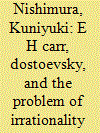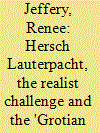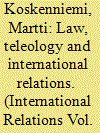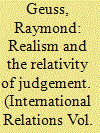|
|
|
Sort Order |
|
|
|
Items / Page
|
|
|
|
|
|
|
| Srl | Item |
| 1 |
ID:
146521


|
|
|
|
|
| Summary/Abstract |
This piece is an imagined email correspondence between three renowned international relations scholars, E. H. Carr, Hedley Bull and Coral Bell, who are discussing the Australian 2016 Defence White Paper. The purpose of such an exercise is to reflect on the ‘big-picture’ international relations questions posed by what might otherwise be thought of as a relatively technical defence policy document. In particular, the correspondence between the three focuses on the central importance of the White Paper’s assumptions of a ‘rules-based global order’ and the relationship between this order and US power. In their time, all three authors spoke directly to questions of power, law and order in their scholarly work, which had been deeply influenced, in all three cases, by periods spent working at the ‘coalface’ of these issues in government in Britain and Australia. As such, Carr, Bull and Bell have much to say about how Australia is positioning itself for a post-unipolar world.
|
|
|
|
|
|
|
|
|
|
|
|
|
|
|
|
| 2 |
ID:
104036


|
|
|
|
|
| Publication |
2011.
|
| Summary/Abstract |
Despite a number of recent studies of Carr's classical theory of international relations, scholars still virtually ignore his early biographical works, especially the one on Dostoevsky. By recovering the connection between Carr's view on international politics and that on Dostoevsky, the present article attempts to advance our understanding about the meaning of Carr's realism-utopianism dichotomy. What Carr tried to do in The Twenty Years' Crisis was to transcend the nihilistic relativism that appeared as a corollary of the rise of the problem of human irrationality. Carr learned from Dostoevsky the epochal meaning of this problem as well as vital insights for generating his own solution to it. Thus arguing, the present article aims at renewing our awareness of the significance of context in the inquiries into early International Relations as well as adding another contribution to the recent revisions of classical realism.
|
|
|
|
|
|
|
|
|
|
|
|
|
|
|
|
| 3 |
ID:
071777


|
|
|
|
|
| Publication |
2006.
|
| Summary/Abstract |
This article argues that although he is ordinarily relegated to the realm of international legal scholarship, Hersch Lauterpacht made a significant contribution to the development of International Relations theory. In particular, it demonstrates that in attempting to address the range of debates surrounding the relationship between law and morality in the interwar and postwar eras, Lauterpacht not only engaged directly with E.H. Carr's criticisms of 'utopian' thought but was responsible for providing the most comprehensive expression of the 'Grotian tradition' to date, a tradition that later appeared in the works of Martin Wight and subsequent scholars. In doing so, this article seeks to achieve not only Lauterpacht's reincorporation into the history of International Relations scholarship but brings into question the disciplinary demarcations that divide the so-called 'disciplines' of International Relations and International Law.
|
|
|
|
|
|
|
|
|
|
|
|
|
|
|
|
| 4 |
ID:
112421


|
|
|
|
|
| Publication |
2012.
|
| Summary/Abstract |
Interdisciplinary approaches often bemoan international law's lack of theoretical sophistication and naïve utopianism. Instead of offering effective tools of governance, it seems committed to outdated ideas about an international public realm and a dubious teleology of progress. This essay - given as the E. H. Carr lecture at the University of Aberystwyth in 2011 - reviews efforts to reform international law into a science and a more efficient instrument of international rule. Such efforts have been a part of international law's internal development but their lack of success depends on a mistaken view of the field as a 'discipline' - a set of theoretical or technical propositions. This essay defends a view of international law as an argumentative practice in which political claims are defended and attacked, rather than as a governance tool or institutional blueprint. At its worst, law may buttress bureaucratic privilege. At its best it may offer, for a cynical world, a vocabulary for imagining better futures. It may also sharpen political thought and strategic awareness, but it cannot replace them.
|
|
|
|
|
|
|
|
|
|
|
|
|
|
|
|
| 5 |
ID:
138080


|
|
|
|
|
| Summary/Abstract |
E.H. Carr contrasts ‘realism’ with ‘utopianism’ in his major work in theorising international relations, but he ought to have contrasted it with ‘moralism’, which is a complex set of attitudes that give unwarranted priority to moral considerations in explaining and justifying human action. ‘Moralism’ is a flawed approach to politics. One should distinguish it from ‘utopianism’, which is made up of different strands, not all of which are equally problematic. One strand which has been historically important was centred around an attempt to describe and realise a perfect unchanging society, and Carr seems to have this in mind primarily when he speaks ‘utopianism’. However, there has been another strand which has focused on the social construction of ‘impossibility’ in politics, and our potential ability to undo that construction. Such utopianism is compatible with realism.
|
|
|
|
|
|
|
|
|
|
|
|
|
|
|
|
| 6 |
ID:
119987


|
|
|
|
|
| Publication |
2013.
|
| Summary/Abstract |
The past 15 years have seen an explosion of interest in the scholarship of E.H. Carr. As a founding figure of the realist approach to International Relations, as a philosopher of history and as a historian of the Soviet Union, Carr made important contributions. His work on the post-war political organisation of Europe has been somewhat neglected. While not going so far as to argue for the introduction of 'another E.H. Carr' - Carr the European integration theorist - this article argues that Carr's specific brand of realism has much to say not only about the establishment, but also about the subsequent development, of the European Economic Community. Carr's realism was, we argue, capable of understanding change in international society. This understanding was grounded in an appreciation of the role of power and morality in international politics and stands in sharp contrast to the emphasis on the structural factors that are prized by neorealists. While Carr's vision of post-war Europe has not materialised in its entirety, it captures some of the crucial fault lines that animate the European project. Building a bridge between European integration studies and Carr's realism will provide a fruitful avenue through which classical realism can once again begin to engage with developments in international politics.
|
|
|
|
|
|
|
|
|
|
|
|
|
|
|
|
| 7 |
ID:
072479


|
|
|
|
|
| Publication |
2006.
|
| Summary/Abstract |
The prohibition against torture has the status of a peremptory humanitarian norm. That is, it is considered binding on all states and no derogation under any circumstances is permitted. While the practice of torture has been widespread, until recently it had come to be understood that no representatives of the state could openly admit that they would use torture for fear of being removed from office and of having their state ostracized by 'civilized' nations. Why, then, given the rhetorical, moral and legal status of this prohibition, is torture being debated, contemplated and even resurrected as an unsavoury and allegedly necessary course of action in this counter-terrorist era? Why has the Bush administration set about trying to reduce the scope of what is meant by torture and degrading treatment, as well as to define a category of detainee who may be subjected to coercive methods of interrogation? And what efforts are being made to restore the status of a norm that has been seen as a distinctive kind of wrong? These are the main questions discussed in an article which examines the relationship between power and norms and the power of norms.
|
|
|
|
|
|
|
|
|
|
|
|
|
|
|
|
|
|
|
|
|